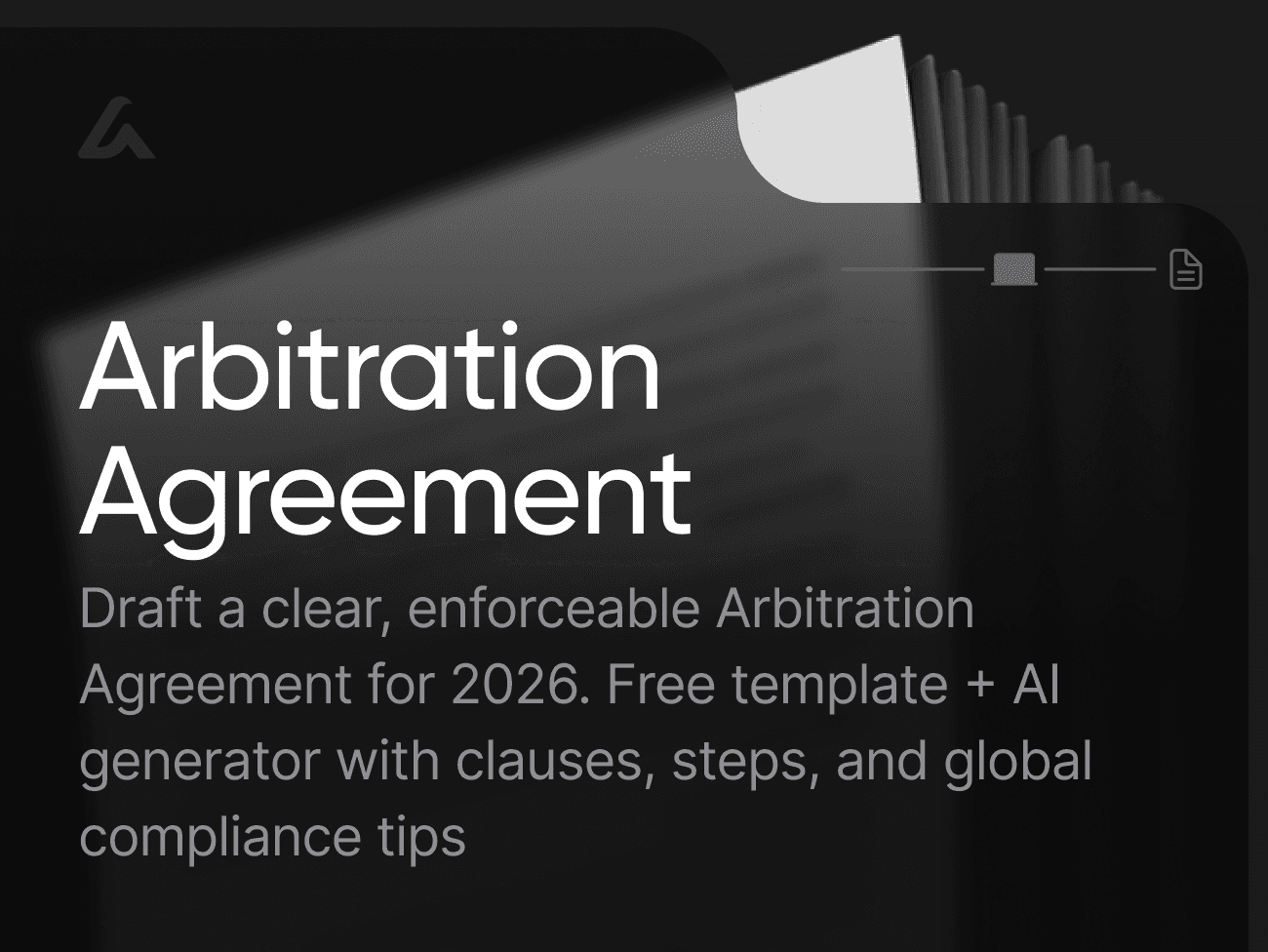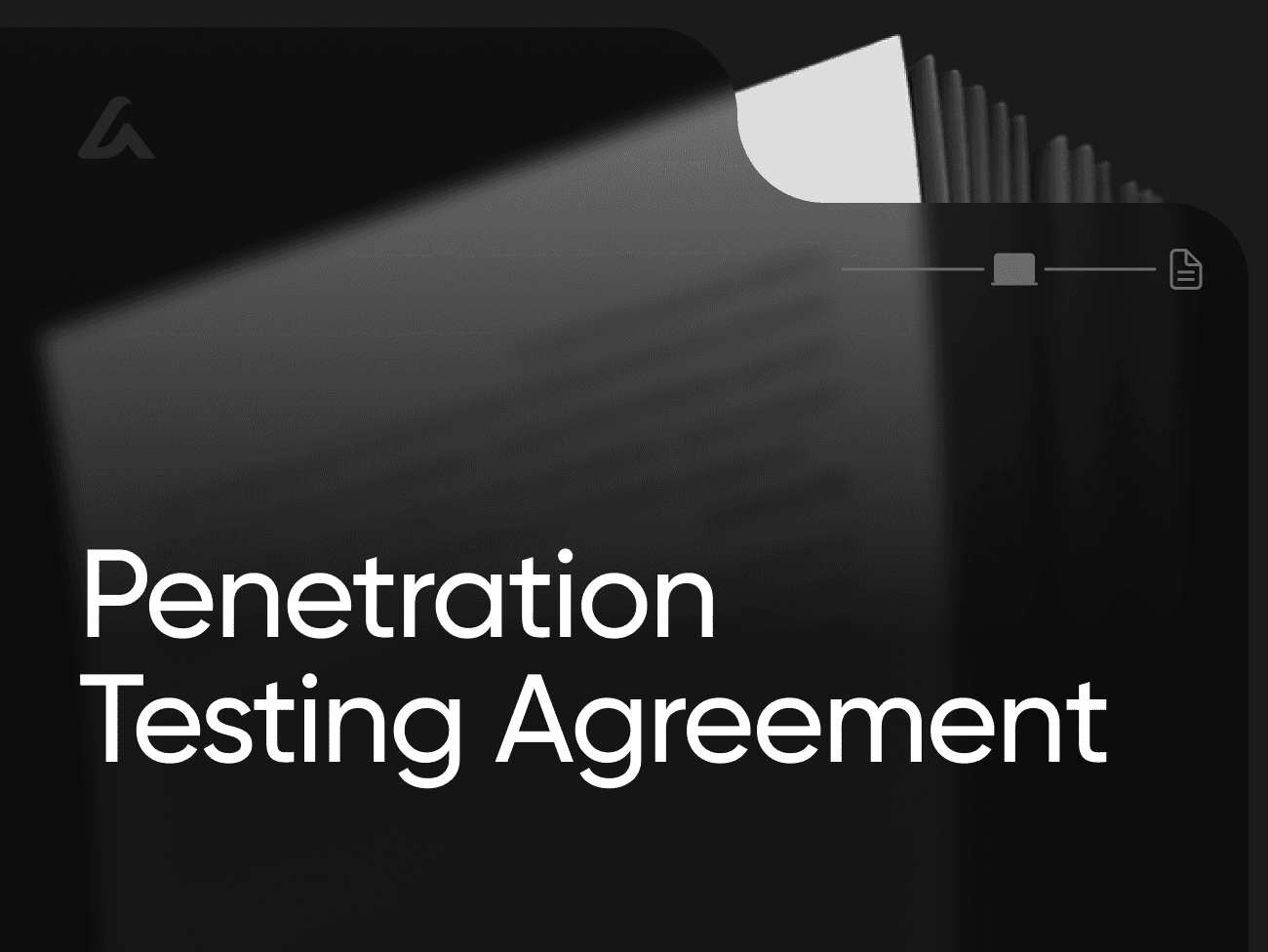AI Lawyer Blog
Arbitration Agreement Template (Free Download + AI Generator)

Greg Mitchell | Legal consultant at AI Lawyer
3
An Arbitration Agreement is a clause or stand-alone contract in which parties agree to resolve disputes through private arbitration instead of court litigation. It typically sets the forum or administering institution (e.g., ICC, AAA-ICDR, LCIA), the seat and governing law, the number and qualifications of arbitrators, procedural rules, discovery limits, confidentiality, costs, and award enforcement. For cross-border and high-stakes commercial matters, arbitration can deliver finality through a binding award that is widely enforceable under international conventions.
To grasp the scale: the International Chamber of Commerce reported 831 new arbitration cases in 2024, with a total pending caseload value of US$354 billion, its highest on record. The London Court of International Arbitration recorded 362 referrals in 2024, with parties from 101 jurisdictions, showing how global the process has become.
Download the free Arbitration Agreement Template or customize one with our AI Generator, then have a local attorney review before you sign.
You Might Also Like:
Architect Services Agreement Template (Free Download + AI Generator)
App Development Agreement Template (Free Download + AI Generator)
1. What Is an Arbitration Agreement?
An Arbitration Agreement is the parties’ consent to have disputes decided by arbitrators rather than judges. It can appear as a clause inside a broader contract or as a separate submission agreement after a dispute arises. A well-drafted clause identifies the administering body (or ad hoc rules), the seat (which determines procedural law and court supervision), the language, the number of arbitrators, and how they will be appointed.
Unlike mediation, arbitration ends with a legally binding award. Compared to court, it offers a private process, specialized decision-makers, and easier cross-border enforcement. Poorly drafted clauses, however, cause delay and satellite litigation — so precision is essential.
2. Why Arbitration Agreements Matter in 2026?
Arbitration agreements are critical this year because:
Cross-border commerce is routine: Parties need a neutral forum and an award that can be enforced internationally without relitigating the merits.
Confidentiality and business continuity: Sensitive pricing, IP, and strategy can be protected better than in many public court systems.
Procedural flexibility: Parties can tailor timelines, discovery, and expert evidence to the technical needs of their dispute.
Judicial recognition: Many jurisdictions increasingly support arbitration through stay-of-litigation and award-enforcement statutes, reducing uncertainty over forum battles.
Mass and employment arbitration trends: Institutions have developed fee schedules and protocols to manage volume efficiently, so drafting choices around joinder and consolidation matter more than ever.
3. Key Clauses and Components
Institution & Rules: Administering body: ICC, AAA-ICDR, LCIA, SIAC, ad hoc (UNCITRAL).
Seat & Governing Law: Seat of arbitration: determines procedural law and court support; governing law of contract: governs merits.
Scope: Covered disputes: contract, tort, statutory claims; include affiliates and successors where appropriate.
Arbitrators: Number/qualifications: sole vs. tribunal of three; industry expertise, language, independence, conflicts.
Procedure: Language, timetable, discovery: documentary exchange limits, witness statements, expert reports, virtual hearings.
Interim Relief: Emergency arbitrator or courts: define access to urgent measures.
Confidentiality: Non-disclosure: award and filings kept private unless enforcement required.
Multiparty Mechanics: Joinder/consolidation: when multiple contracts or parties are involved.
Costs & Fees: Allocation: tribunal’s power to award costs; deposits; cost-shifting rules.
Award & Enforcement: Final and binding: reasoned award, interest, currency, seat-court support for enforcement.
4. Legal Requirements and Global Framework
Arbitration relies on supportive national laws and international treaties:
UNCITRAL Model Law: Adopted in 93 states covering 127 jurisdictions, providing a harmonized legislative template for arbitration procedure and court assistance.
Institutional Rules: ICC, AAA-ICDR, and LCIA update rules to address emergency relief, consolidation, and technology. In 2024 the ICC confirmed robust global usage and appointment practices; detailed figures are published in its annual statistics.
National Courts: Many legal systems strongly back arbitration, staying court proceedings and enforcing awards subject to limited defenses. Recent case law in major jurisdictions continues to clarify stay, jurisdiction, and enforcement boundaries, reinforcing predictability.
5. How to Customize Your Arbitration Agreement
Match forum to transaction: Choose an institution and seat familiar with your sector (tech, construction, energy, finance).
Right-size the tribunal: Sole arbitrator for lower-value disputes; three arbitrators for complex or high-value matters.
Define scope clearly: Include “arising out of or relating to” language; reference related documents and affiliates.
Address multiparty reality: Add joinder and consolidation language across interdependent contracts.
Plan for urgency: Enable emergency arbitrator relief and court support for interim measures.
Control cost and time: Cap document production, permit remote hearings, and set page/time limits in the clause or procedural order.
Preserve confidentiality: Include robust non-disclosure and limited publication permissions.
Allocate costs sensibly: Provide for cost-shifting to deter weak claims and encourage efficiency.
6. Step-by-Step Guide to Drafting One
Step 1-Define scope: State which disputes are arbitrable and incorporate related agreements and affiliates.
Step 2-Choose rules and institution: Select ICC, AAA-ICDR, LCIA, SIAC, or ad hoc with UNCITRAL Rules; confirm administrative fees fit the deal size.
Step 3-Pick the seat: Choose a neutral, arbitration-friendly jurisdiction; the seat’s law governs procedure and court support.
Step 4-Set tribunal structure: Decide sole vs. three arbitrators; define qualifications (language, expertise) and appointment mechanics.
Step 5-Set procedure and timelines: Specify language, witness statements, expert reports, virtual hearing options, and discovery limits.
Step 6-Enable interim relief: Allow emergency arbitrator provisions and non-waiver of court interim measures.
Step 7-Add multiparty tools: Include joinder and consolidation to avoid parallel proceedings.
Step 8-Address confidentiality and data: Bind parties to keep pleadings and awards confidential; set cybersecurity expectations.
Step 9-Allocate costs: Authorize tribunals to award costs and interest; set deposit arrangements.
Step 10-Finalize award terms: Require a reasoned, final, and binding award; specify currency and interest.
7. Tips for Cost, Speed, and Enforceability
Pick a supportive seat: Courts should enforce arbitration agreements and awards swiftly; research local practice before choosing.
Use model clauses: Institutions publish tested language — adapt, don’t reinvent.
Scale discovery: Limit document production and depositions; rely on written witness statements where possible.
Calendar discipline: Hard deadlines and page/time limits reduce drift.
Cybersecurity & confidentiality: Follow the institution’s security protocols; define who may access the record.
Think ahead to enforcement: Draft awards to be easily recognizable by enforcement courts (clear parties, sums, interest).
Coordinate with insurers & lenders: Ensure arbitration terms align with policy or finance covenants to avoid coverage or consent issues.
8. Checklist Before You Sign
Institution and rules identified (or ad hoc with UNCITRAL Rules).
Seat of arbitration and governing law stated.
Number of arbitrators and appointment method specified.
Scope of disputes defined, including affiliates and related contracts.
Interim relief pathway (emergency arbitrator/court) included.
Confidentiality and data-security obligations added.
Consolidation/joinder language for multiparty disputes provided.
Discovery limits, hearing format, and timetable addressed.
Costs and fee-shifting authority granted to tribunal.
Award form (reasoned, final) and interest/currency clarified.
Download the Full Checklist Here
9. Common Mistakes to Avoid
Omitting the seat: Without a seat, you risk fights over procedural law and court supervision.
Vague scope language: Narrow clauses fuel parallel court litigation and arbitrability disputes.
No multiparty tools: Related contracts can produce inconsistent awards without consolidation/joinder.
Silence on confidentiality: Sensitive data can leak without express duties.
Over-engineering discovery: Court-style discovery defeats arbitration’s speed and cost advantages.
Ignoring enforcement realities: Pick a seat and drafting style friendly to enforcement where the counterparty’s assets sit.
10. FAQs
Q: What’s the difference between the seat of arbitration and the hearing venue?
A: The seat is the legal “home” of the arbitration and determines the procedural law and which courts can assist or set aside awards. Hearings can happen anywhere (or virtually) without changing the seat. Choosing a pro-arbitration seat is critical because local courts handle interim relief and annulment actions, which directly affect speed and enforceability.
Q: Should we choose a sole arbitrator or a three-member tribunal?
A: A sole arbitrator is faster and cheaper, suitable for routine or lower-value disputes. A three-member tribunal offers broader expertise and safeguards for complex or high-value matters. Consider dispute value, technical complexity, and the importance of perceived neutrality when deciding. Your clause can scale by tying tribunal size to claim thresholds.
Q: How private is arbitration?
A: Most institutional rules let parties keep pleadings and awards confidential, and hearings are private, but laws differ by seat. Some institutions publish anonymized awards or statistics. If confidentiality is crucial, add explicit obligations in the clause and limit who may access filings. Also address data security, especially for cloud-based evidence and remote hearings.
Q: Can we still go to court for urgent relief?
A: Yes. Many rules provide emergency arbitrators for interim measures, and most legal systems allow parties to seek court injunctions without waiving arbitration. Clarify this in your clause so parties can protect assets or evidence quickly. Courts at the seat usually complement, not replace, arbitral powers on urgency.
Q: Which institutions handle the most cases?
A: Activity is broad. The ICC registered 831 new cases in 2024 and reported a US$354 billion aggregate caseload value at year-end. The AAA-ICDR reported over 530,000 domestic cases administered by AAA in 2024 and 811 international filings at ICDR that year, showing scale across consumer, employment, and commercial disputes. The LCIA recorded 362 referrals in 2024 with parties from 101 jurisdictions, reflecting its international mix.
Sources and References
Legal and procedural insights in this article are informed by the UNCITRAL Model Law on International Commercial Arbitration (as amended 2006), the 1958 New York Convention on the Recognition and Enforcement of Foreign Arbitral Awards, and institutional guidance from the ICC International Court of Arbitration, LCIA Arbitration Rules, and AAA–ICDR International Arbitration Rules.
Statistical data reference the ICC Dispute Resolution Statistics 2024 and the LCIA Annual Casework Report 2024.
Comparative enforcement and best-practice commentary align with analyses by the International Bar Association (IBA) Arbitration Committee and the OECD Global Arbitration Review of Cross-Border Dispute Resolution Frameworks.
Disclaimer
This article is for informational purposes only and does not constitute legal advice. Arbitration laws, institutional rules, and enforcement practices vary by jurisdiction and change over time. Always consult a qualified attorney in your jurisdiction before drafting, signing, or relying on an Arbitration Agreement.
Get Started Today!
A precise Arbitration Agreement can save time, reduce cost, and deliver enforceable outcomes across borders. Draft it with the right seat, rules, and scope so your dispute process works when it matters.
Download the free Arbitration Agreement Template or customize one with our AI Generator — then have a local attorney review before you sign.
You Might Also Like:



